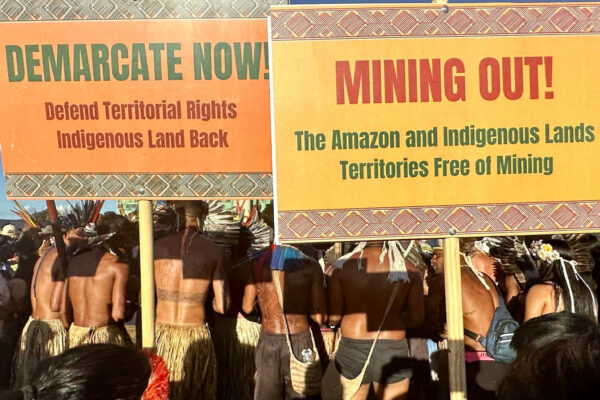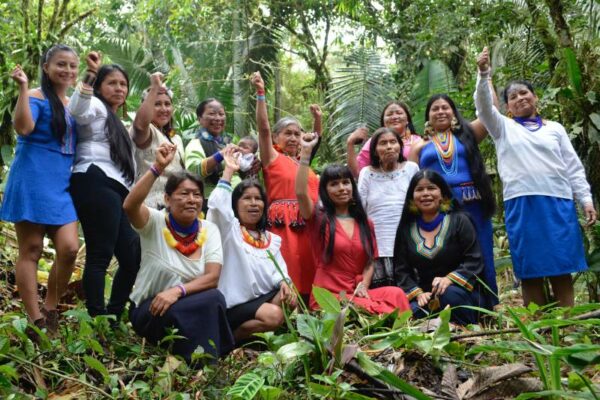December 2, 2005
Mr. Ray L. Hunt, CEO
Hunt Oil Company
Fountain Place, 1445 Ross at Field, Suite 1400
Dallas, TX 75202-2785
Dear Mr. Hunt,
We have just learned that the Camisea pipeline in Peru has suffered its fourth rupture in less than fifteen months in operation, spilling 4,500 to 6,000 barrels into the Yotsiva, Parotori, Picha and Urubamba rivers. We are writing to express our strong condemnation of Hunt Oil for its failures to prevent unnecessary harm to the health and livelihoods of local peoples and the highly biodiverse and fragile tropical rainforests of the Peruvian Amazon. We express our deep dismay at Hunt’s unwillingness to seriously consider feasible measures that could prevent further avoidable damage in the current and future phases of the Camisea project. Two immediate measures we are urging you to adopt are:
1) Extended Reach Drilling (ERD) to minimize the project’s footprint, and
2) Immediate hydrostatic testing of the pipeline to detect defects and prevent future spills.
Leading drilling specialists have suggested that ERD could make the extraction of hydrocarbon resources from existing facilities in Camisea’s Block 88 feasible without further incursions into the Kugapakori-Nahua Reserve for isolated and uncontacted indigenous peoples. Extended Reach Drilling is also a promising alternative for Block 56, one that could minimize intrusive infrastructure in the native communities of the area. Yet for the last ten months, Hunt has failed to carry out a rigorous independent analysis of ERD. Instead your company has turned to an inadequate analysis done by Pluspetrol for Block 88 and moved forward with seismic testing and platform construction in Block 56 under the rationale that the design process is too far along to implement a different approach. This mirrors the decision to site the NGL fractionation plant and marine export terminal in Paracas Bay (in the buffer zone of Peru’s only marine reserve) and demonstrates a pattern of ignoring more sustainable alternatives.
We would like to remind you, Mr. Hunt, of a January 9, 2005 letter to you in which Amazon Watch articulated the need to protect the health and future survival of the Nanti people living in the Kugapakori-Nahua Reserve as well as minimize intrusive infrastructure inside Block 56 by exploring ERD. Similarly, Peruvian civil society provided official comments on the draft Environmental Impact Assessment for Block 56 in January 2005 recommending the use of ERD for Block 56. More importantly, there was a direct request in January by the indigenous federations COMARU and CECONAMA on the use of ERD following the December 2004 liquid petroleum spill in Kemariato. Finally, Hunt Oil, as a lead partner in TGP, is legally bound to adopt environmental standards as defined in the World Bank Pollution Prevention and Abatement Handbook as per the Inter-American Development Bank loan condition ESIR 8.11(i). Had Hunt Oil undertaken a serious study of the viability of ERD in the Camisea complex ten months ago, efforts to minimize the impacts of Block 56 would have now been well underway.
Instead, as a result of the project, serious environmental and social impacts are now affecting the entire local population. Already there have been four liquid petroleum spills since the start of operations in August 2004. These spills have led not only to serious environmental impacts, but have fueled indigenous opposition – resulting in the months-long suspension of Block 56’s public consultation process and a 3-week river blockade in Atalaya. More recently, these spills have led to the Peruvian Ministry of Energy and Mines’ call for an audit of the Camisea project. And today during a press conference in Lima, the indigenous federations COMARU, CECONAMA and FECONAYY announced plans for a river blockade. These organizations are demanding, among others, a full clean up of the affected areas and complete disclosure on the cause of the spill.
By contracting serious independent experts to assess the viability and options for Extended Reach Drilling, Hunt Oil has the opportunity to become a leader in the oil industry and establish a positive precedent in the ecologically fragile Amazon region. But this window of opportunity is quickly closing, and Hunt Oil must act now in order to avoid potentially damaging repercussions to the company’s reputation and project’s finances.
In relation to avoiding future spills, experts have suggested that the only method to determine the integrity of the pipelines is to halt the pipeline’s operations and conduct a comprehensive hydrostatic test of the entire pipeline. TGP has repeatedly claimed it has an intelligent PIG to detect any failures in the pipeline. However, this method has been shown to be inadequate. We urge Hunt Oil to work immediately with the local affected communities, its commercial partners and the Peruvian government to fully investigate the cause of the spills – including, if necessary, a temporary shutdown of the pipeline to facilitate a thorough inspection – and to take measures to prevent future spills.
We remind Hunt Oil about the financial consequences the consortium suffered in 2003. After failures by Hunt and Pluspetrol to implement adequate environmental and social safeguards, environmental and human rights groups waged a high profile campaign that blocked $213 million in loans from the U.S. Export-Import Bank. This decision also had serious consequences on other export credit agencies around the world that had considered financing the project.
Mr. Hunt, it is our hope that your company will recognize the global importance of the Amazon’s environment, the serious damage caused by the Camisea project to date, and the urgent need to take adequate safeguards to prevent further harm to local populations.
We await your prompt response and the opportunity to meet with you and Hunt’s senior management to discuss solutions.
Sincerely,
Maria Lya Ramos, Amazon Watch, maria@amazonwatch.org
Peter Kostishack, Amazon Alliance, peter@amazonalliance.org
Aaron Goldzimer, Environmental Defense, agoldzimer@environmentaldefense.org
Nadia Martinez, Sustainable Energy and Environment Network, nmartinez@seen.org
Elizabeth Bast, Friends of the Earth, ebast@foe.org
Francis Grant-Suttie, World Wildlife Fund, francis.grant-suttie@WWFUS.org
Ian Gary, Oxfam America, igary@OxfamAmerica.org
Cc:
Mr. James Jennings, Chairman, Hunt Oil Company
Mr. Steve Hurley, President, Hunt Oil Company
Mr. Steve Suellentrop, President, Peru LNG Company
The Hon. Jeanne L. Phillips, Senior Consultant for Governmental and Public Affairs, Hunt Consolidated
Mr. Ciro de Falco, Executive Vice President, Inter-American Development Bank
Mr. Philippe Birebent, Private Sector Department, IDB
Ms. Janine Ferretti, Environment Division Chief, IDB
Mr. Alejandro Valencia, Vice President, Societe General
Mr. Keith Kozloff, Senior Environmental Advisor, U.S. Treasury Department
Ms. Leslie Johnston, Multilateral Development Banks Environmental Advisor, USAID
James Grimaldi, Washington Post
Juan Forero, the New York Times
Ken Siverstein, Los Angeles Times
Gareth Chetwynd, Upstream Magazine
Export Import Bank
Goldman Sachs
International Finance Corporation
Moody’s Investor Service
Standard & Poor’s













